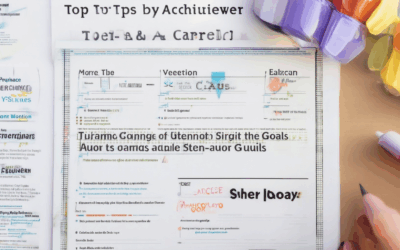Staying productive under stress can feel like an uphill battle, especially when deadlines loom and tasks pile up. Whether you’re juggling a demanding job, managing family responsibilities, or navigating the challenges of working from home, stress often creeps in, making it harder to maintain focus and efficiency. But here’s the good news: there are proven strategies to counteract stress and keep your productivity intact. This guide explores effective ways to stay sharp even when life gets overwhelming, offering actionable tips, insights, and approaches to help you thrive despite pressure. From mastering stress management techniques to discovering creative methods for staying productive, we’ll delve into the tools and mindset needed to navigate stress while maintaining peak performance.
Key Takeaways
- Prioritize Self-Care: Maintain mental and physical well-being through regular exercise, mindfulness, and sufficient sleep to enhance productivity under pressure.
- Practice Mindfulness: Incorporate meditation and breathing exercises to reduce stress and improve focus, keeping your mind sharp even during challenging times.
- Build Strong Relationships: Foster connections with supportive individuals to gain emotional support and boost resilience against stress.
- Maintain a Healthy Lifestyle: Exercise regularly, eat nourishing meals, and ensure quality sleep to sustain energy and cognitive function.
- Set Realistic Goals: Create achievable objectives to manage stress and drive efficiency, allowing you to stay productive despite pressures.
- Leverage Time Management: Organize tasks effectively to minimize overwhelm and maximize productivity, making the most of your available time.
- Stay Confident: Cultivate self-assurance to approach challenges with a positive outlook, enhancing your ability to thrive under stress.
- Adopt Quick Stress Relief Techniques: Use methods like deep breathing, light exercise, or humor to instantly alleviate stress and maintain focus.

How to Be Productive When Stressed?
Stress can often hinder productivity, leaving you feeling overwhelmed and less motivated. However, with the right strategies, you can maintain focus and efficiency even during challenging times. Here’s a step-by-step guide to staying productive while managing stress:
- Set Clear Priorities:** Identify the most important tasks and focus on those first. Breaking down larger projects into smaller, manageable steps can reduce feelings of overwhelm.
- Limit Distractions:** Create a dedicated workspace free from unnecessary clutter and notifications. Use apps or tools to manage incoming messages and block distracting websites.
- Practice Mindfulness:** Take short, intentional breaks to recharge your mind. Techniques like deep breathing or quick meditation can help you refocus and reduce stress levels.
- Stay Organized:** Utilize planners or digital tools to track your tasks and deadlines. A tidy workspace and organized schedule can significantly boost your productivity.
- Engage in Physical Activity:** Even a brief walk or some light exercise can improve your mood and energy levels, helping you maintain focus throughout the day.
Remember, it’s essential to be kind to yourself during stressful times. Celebrate small victories and remind yourself that progress, no matter how incremental, is still progress. By implementing these strategies, you can navigate stress while maintaining your productivity levels.
For more tips on managing stress and enhancing productivity, explore additional resources and guides designed to support your well-being and success. Stay focused, stay calm, and keep moving forward!
How to Be 100% Productive with 0% Stress?
Being highly productive while maintaining low stress levels requires a combination of mindset, routine, and environment optimization. Here’s a step-by-step guide to achieving this balance:
- Adopte el adecuado estado de mente: Comprende que la productividad no solo es sobre trabajo, sino también sobre bienestar emocional. Practica la meditación, la respiración profundizada y la gratitud diaria para reducir el estrés y aumentar la claridad mental.
- Desarrolle una rutina eficiente: Planifique su día con actividades prioritarias y usue un cronómetro para gestionar su tiempo de manera efectiva. Asegúrese de tener tiempos libres suficientes para descansar y recrearse.
- Optimice su entorno de trabajo: Crea un espacio cómodo y organizado donde puedas concentrarte plenamente. Usa herramientas sencillas y accesibles para simplificar sus tareas diarias.
- Utilice las herramientas adecuadas: Explora plataformas y aplicaciones que puedan ayudarte a gestionar tu tiempo y prioridades de manera más eficiente. Por ejemplo, 7Del.net ofrece recursos y estrategias prácticas para mejorar tu productividad.
- Mantenga un estilo de vida saludable: Ejercite regularmente, cumpla con una dieta equilibrada y asegúrese de obtener suficiente sueño. Estos factores influyen en tu energía y concentración.
- Organiza tus pendientes: Usa sistemas de gestión como la metodología Pomodoro o la técnica de la lista de tareas para管理你的任务 de manera eficiente sin sentirte abrumado.
- Adopta una actitud flexible: Entiende que es normal que haya días donde no logras alcanzar todo lo planeado. Perdónate a ti mismo y usa esto como oportunidad para ajustar tu planificación futura.
- Aprende continuamente: Mejora tus habilidades y conocimientos constantemente para stay ahead en tu campo. Esto no solo incrementa tu productividad, sino que también te hace más confiado en tus capacidades.
Recuerda que la clave está en encontrar el equilibrio entre trabajo y bienestar. Al implementar estas estrategias, podrás lograr una productividad maximal_while manteniendo un nivel de estrés mínimo. Visita 7Del.net para descubrir más recursos y artículos sobre productividad y salud mental.

Productively Deal with Stress
Dealing with stress effectively requires a multifaceted approach that addresses both mental and physical well-being. Here are some proven strategies to manage stress and maintain productivity:
- Avoid Overload: Recognize when you’re overwhelmed and take proactive steps to reduce pressure. Prioritize tasks and set realistic deadlines.
- Exercise Regularly: Engage in physical activities like jogging, yoga, or simply walking to release endorphins and improve mood. Even brief sessions can significantly reduce stress levels.
- Breathe Deeply: Practice mindfulness through deep breathing exercises to calm your mind and body during stressful moments.
- Stay Organized: Use tools like planners or digital calendars to manage your schedule efficiently and minimize last-minute pressures.
- Connect with Others: Share your feelings with trusted friends, family, or professionals who can offer support and perspective.
- Limit Stimulants: Reduce consumption of caffeine and alcohol, as these can exacerbate stress and disrupt sleep patterns.
- Practice Gratitude: Focus on positive aspects of life by journaling things you’re thankful for, which can shift your mindset toward resilience.
For more insights and actionable strategies, visit 7Del.net to explore our comprehensive guides on mental health and productivity.

What Are 5 Coping Strategies for Stress?
- Practice Regular Exercise: Engage in physical activities like jogging, yoga, or simply taking a walk to reduce stress hormones and improve mood.
- Meditate Daily: Spend a few minutes focusing on your breath or repeating calming mantras to center your mind and body.
- Journal Your Thoughts: Write down your feelings and experiences to gain clarity and process emotions in a healthy way.
- Seek Social Support: Talk to friends, family, or a professional about your stress to share the burden and receive guidance.
- Manage Time Effectively: Create a schedule that allows you to stay organized and meet your priorities, reducing feelings of overwhelm.
The Five C’s for Coping with Stress
- Confidence: Believing in your ability to handle stressful situations can boost your resilience. Self-assurance allows you to approach challenges with a positive mindset.
- Control: Taking charge of your life helps manage stress. Set realistic goals, communicate effectively, and establish healthy boundaries to maintain balance.
- Connections: Building strong relationships provides emotional support during tough times. Surround yourself with positive influences who can offer encouragement and understanding.
- Commitment: Staying focused on your long-term goals can give you motivation to overcome obstacles. Clarity of purpose helps you navigate stress with intention.
- Care: Prioritizing self-care is essential. Engage in activities that relax you, practice mindfulness, and ensure you’re getting enough rest to maintain your well-being.

How to Destress Quickly
Here are some effective methods to relieve stress instantly:
- Deep Breathing Exercises : Practice slow, deep breathing to calm your mind and body. Inhale deeply through your nose for four counts, hold for four seconds, and exhale slowly through your mouth for six counts. Repeat this process several times to reduce tension.
- Physical Activities : Engage in light exercise like stretching, yoga, or a short walk to release physical tension and boost endorphins.
- Progressive Muscle Relaxation : Tense and then relax each muscle group from your toes up to your head, focusing on areas you feel most tense.
- Mindfulness Techniques : Take a few minutes to focus on the present moment through meditation or guided imagery to clear your mind.
- Social Connections : Reach out to a friend, family member, or colleague to share your feelings and gain support.
- Humor : Find something to laugh at or remind yourself of past funny moments to lift your mood naturally.
- Set Boundaries : Limit screen time and create a calming environment to reduce overwhelm.
- Aromatherapy : Use essential oils like lavender or citrus to promote relaxation when diffused or inhaled.
- Sleep Hygiene : Ensure you get adequate rest by maintaining a regular sleep schedule and creating a relaxing bedtime routine.
By incorporating these techniques into your daily life, you can manage stress more effectively and maintain a healthier mindset. Consistent practice of these methods can lead to long-term stress reduction.




0 Comments